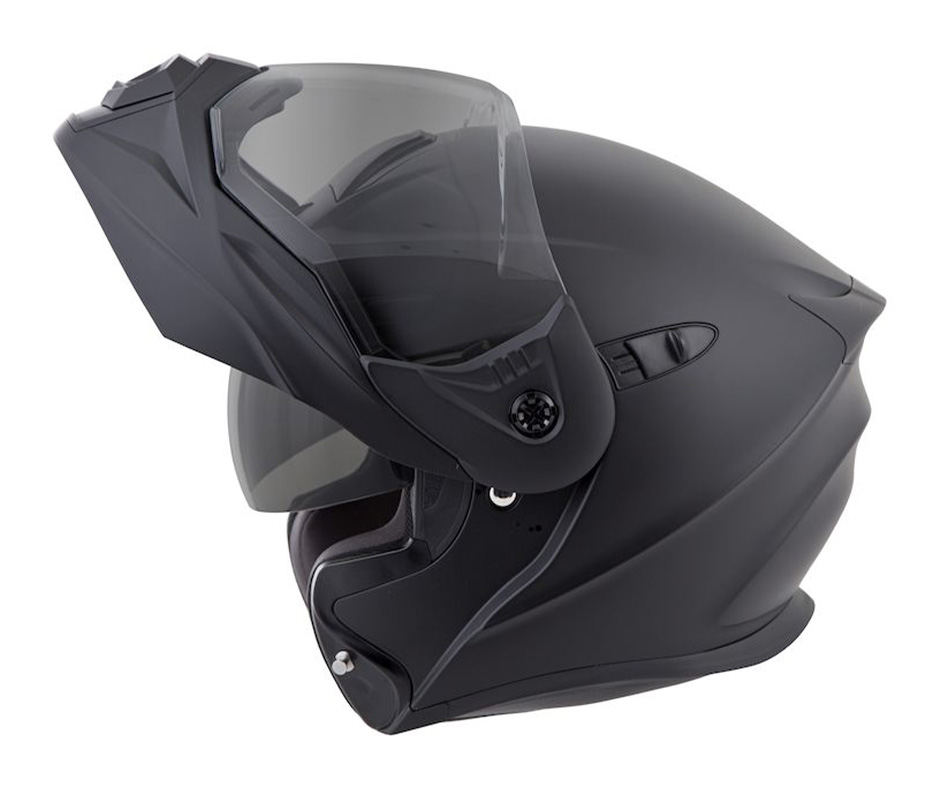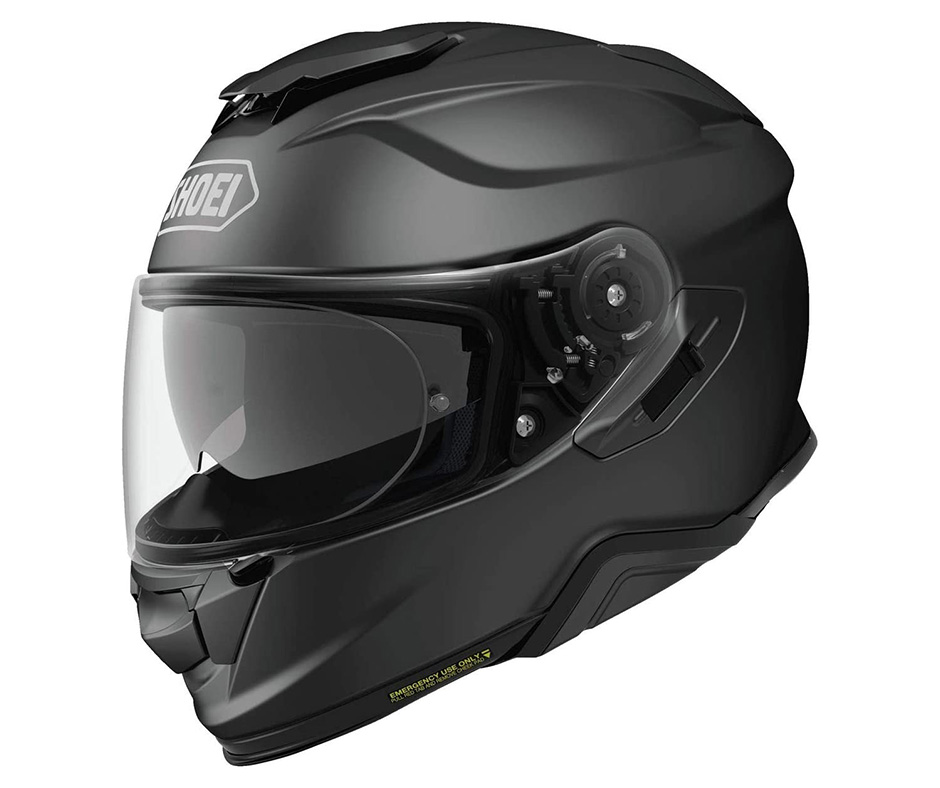A motorcycle helmet is the most important piece of safety equipment every rider can purchase. These helmets protect your brain from lethal blows and determine how comfortable and breathable your trips will turn out. But, with the different types and styles of motorcycle helmets, this decision can be quite confusing for even skilled motorcyclists.
The top four styles include full-face, modular, dual sport, and open-face motorcycle helmets with each having its own pros and cons. Today, we will take a deeper look at its first two types, full-face and modular helmets, and decide which one is best suited for what purposes.
Taking into account their safety, comfort, and integrated technology, continue reading ahead to find a definitive answer to the question of modular vs full-face helmet!
Modular vs. Full Face
Before we begin listing down their advantages and disadvantages over one another, let us briefly discuss the structure and design of each of these helmet types.
Full-face helmets
Introduced by Bell helmets in the early 1960s, full face helmets are designed to offer complete head to neck coverage. They quickly rose to popularity right after their release because of the included chin bar design that absorbed all harsh impacts, greatly boosting the safety of your helmet.
Given its innovative full-face body, this helmet type is the go-to choice for every skilled racer, stuntman and dangerous motorcyclists who frequently find themselves in unfortunate accidents. These helmets also have a round bubbled aerodynamic style that stays securely on your head while you partake in professional stunts and performances.
Now, let’s see who is the targeted audience of this incredibly secure helmet type. Everyone who plans to trail or cruise in a crouched position is at a greater risk of accidents and therefore encouraged to use a full-face helmet. This type also guarantees face protection meanwhile the slightly angled visor grants you a wider horizontal field view.
What people like:
- Versatile and safe choice for different riding styles.
- Covers head and neck completely for utmost protection from severe injuries.
- Chin bar for impact absorption and dissipation.
- Sticks to head even when riding at high speeds.
- Adequate ventilation for reduced sweat and fogging using front, side and top channels.
- Protective and wide visor.
- Aerodynamically round shape to support various riding positions.
- Lack of lifting visor mechanism reduces the overall weight of the helmet.
What people don’t like:
- People find the full-face design uncomfortable and claustrophobic.
- Interior becomes too stuffy and heated during intense racing.
- Some helmets are difficult to use while wearing eyeglasses.
- Many helmets lack built-in sun visors.
Modular Helmets
Although they were released much later than the full-face type, modular helmets have become the best-selling motorcycle helmet type in a very short span of time. To know the reason behind this spike in their popularity, let us discuss the design of these helmets.
Modular helmets or sometimes known as flip-up helmets are a hybrid combination of full-face and ¾ shell coverage. Apart from the inclusion of a chin bar for adequate impact absorption, these helmets feature a detachable face shield. This visor and other added chin bar reinforcements make modular motorcycle helmets heavier than a full-face one.
Flip-up helmets are ideal for tourists and adventure riders who lift up their face shield from time to time to keep track of their location, pick up important calls or just enjoy the feel of fresh air hitting their faces. This experience is made comfier with the use of UV and fog resistant materials in its chin bar and visor. However, the additional hinge structure reduces the safety of a modular helmet as compared to a full face one.
What people like:
- Variety of finished round shapes for aerodynamic structure.
- Combination of full face and ¾ design.
- Hinge structure to easily slide the visor up and down.
- UV protected tinted sun visor with straightforward eye openings.
- Enhanced breathability during humid and hot weather conditions.
- Allows light snacking and conversing with pop-up face shields.
- Comfortable and easier to wear for people with eyeglasses.
What people don’t like:
- Slighter heavier and larger bodies due to visor lifting mechanisms.
- Prone to being pulled off your head and disengaged during dangerous crashes.
- Less reinforced chin bar offers less safety as compared to a full-face design.
- Produces loud road and wind noises.
Better Head Safety: Full-face helmet
Like we mentioned earlier, full-face helmets can not be beaten by any other type in terms of head safety. The safety of any motorcycle helmet is determined by looking at its safety certification being DOT, ECE and SNELL standards.
While you may find numerous helmets exceeding DOT and ECE safety standards, no modular helmet is capable of meeting the SNELL safety regulations. This is mainly because SNELL does not consider a helmet safe unless it has a stable and reinforced chin bar system like that in full-face helmets.
To conclude, full-face helmets are inevitable in terms of protecting your head from harsh blows and critical falls. If you demand a sufficiently high level of safety from a modular helmet, always opt for a product approved by ECE standards.
Better Head Security: Full-face helmet
Head security determines how easily your motorcycle helmet will fall off your head in case of unfortunate incidents or harsh winds. This factor also plays a vital role in deducing the overall safety of your helmet and is once again perfected by the full-face helmet type.
Head security relies on how reinforced the chin bar system in any helmet is. Since the chin bars of modular helmets are not unified with the rest of the body, it is unsafe and unreliable. On the other hand, full-face helmets make use of a single reinforced chin bar that absorbs impacts and offers optimal head security.
Locking mechanisms also help the helmet stick over your head during crashes. There is plenty of evidence available that suggests that modular helmets often disengage their chin bars during drastic crashes. Therefore, it is evident that full-face helmets deliver a higher degree of head security in contrast to modular helmet types.
Better Ventilation: Modular Helmet
The only rule that applies to the ventilation of motorcycle helmets is you get what you pay for. Even though modular helmets have a much breathable shell design, it is perfectly possible to find adequate air supply in a full-face helmet as well, just for a higher price.
Many helmet components play a part in boosting your air intake including features such as chin vents, crown vents, exhaust ports and perforated inner linings. Look for these details and make a decision based on your preference, riding style and head size.
As far as fogging is considered, Pinlock visor is the right answer for both, modular and full-face motorcycle helmets. These anti-fog lenses are either included in your package separately or ready for use. For those of you on a tight budget, you may use anti-fogging sprays as an alternative to the Pin lock system.
Better Intercom Compatibility: No significant difference
With the advancement in technology, intercom systems in motorcycle helmets have become the new norm of today. These, not only let you stay connected with your loved ones or opponents while on the road but keep you entertained as well with their radio and music system.
Cardo Bluetooth speaker and microphone systems are compatible with both, full-face and modular helmets and there is no significant difference in the audio quality and performance of each type. However, the installation process of the intercom system varies between each type.
In the case of a full-face helmet, you simply need to mount your microphone on the present hook and patch it up with the helmet’s chin bar. Whereas, a modular helmet requires a hybrid microphone to install the communication system, similar to how it functions in an open-face helmet.
Frequently Asked Questions (FAQs)
What is the difference between a full-face helmet and a modular face helmet?
Full-face helmets completely cover your face at all times, for maximum safety and security. However, modular helmets are much more breathable, heavier, and comfortable when using it for casual strolls or touring around.
Are modular helmets safe in a crash?
Since they are not worthy of the SNELL certificate, modular helmets only offer moderate safety during crashes. However, an ECE certificate and stable locking mechanism help enhance its safety to a certain degree but they still remain unsuitable for performing stunts and professional racing.
Are full-face helmets quieter than modular?
Yes! Full-face helmets block out road and wind noise much more effectively in comparison to modular helmets. They are also lighter in weight and thereby far more comfortable than modular shell designs.
What is the safest full-face motorcycle helmet?
Shoei-X Fourteen Aerodyne is rated as the best full-face motorcycle helmet of 2022. This is closely followed by the Arai Signet X, AGV Pista GP and Shoei RF-SR motorcycle helmet.
What is the lightest modular motorcycle helmet?
Although the answer to this varies from person to person, most users agree that the Avg Sportmodular and HJC RPHA 90S Carbon are the lightest modular motorcycle helmets on our list.
Final Verdict
And with that being said, it is time for us to put an end to the long-going debate about modular versus full-face motorcycle helmets. Based on the factors listed above and our own personal test results, we claim full-face motorcycle helmets to be the ideal type of helmet for every beginner as well as a professional rider.
Winning over its users with remarkable safety, full-face helmets are proven to save your lives in many circumstances and be ideal for long-term use. You are of course titled to your own opinion and might opt for the modular type of helmet if breathability, style, and fun are important to you.
Decide between both of these types after considering your head size, riding style, surrounding conditions, and the level of safety and comfort you desire from your selected helmet. After all, the right motorcycle helmet can be the game-changing element of your races, stunts, and casual strolls so remember to make this decision wisely.
Until then, happy and safe riding everyone!


